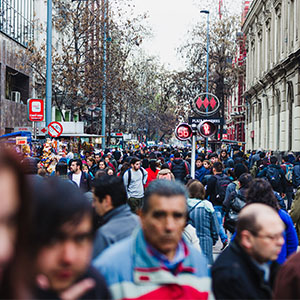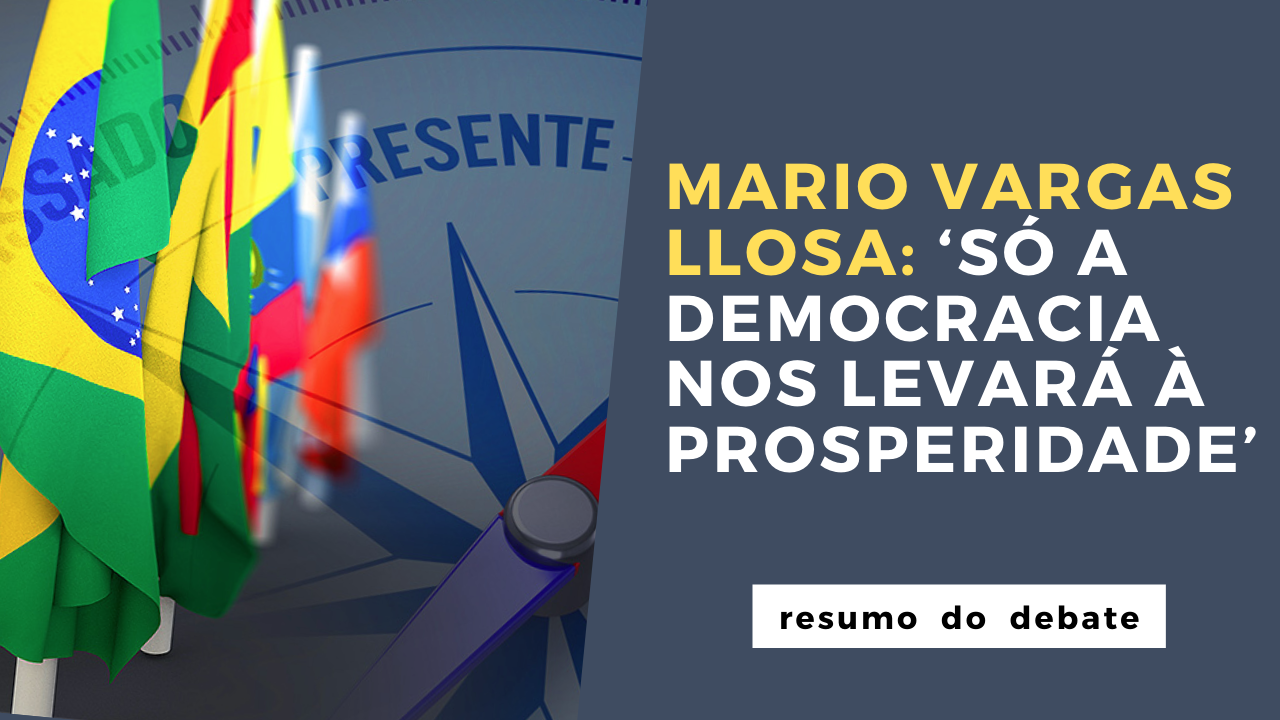Corruption and populism are closely linked in Latin America and, although our democracies are imperfect, the democratic path is the only one that can lead to the reduction of social inequality and economic prosperity. This was the primary message of this online chat with Peruvian writer Mario Vargas Llosa and participants; Rosiska Darcy (writer), Marcos Azambuja (ambassador), Merval Pereira (journalist), José Pio Borges (CEBRI Chairman), and Sergio Fausto, director of the FHC Foundation. The two institutions hosted the meeting.
“Corruption is a legacy that comes from afar, and it infests most South American countries. Nothing demoralizes a society so much, and no democracy can resist it. Forces must be united to face it, but always through active democracy and updated institutions,” said the author of about 50 books (fiction, non-fiction, and theater), among them “Conversation in the Cathedral” (1969 1st edition, 1975 English edition), “Aunt Julia and the Scriptwriter” (1977 1st edition, 1982 English edition) and “War of the End of the World” (1981 1st edition, 1984 English edition), the latter on the War of Canudos.
According to the speaker, “even our imperfect democracies represent progress in the face of the military dictatorships that marked the 19th and 20th centuries in Latin America, and the guerrillas inspired by Cuba and the communism that terrified some of our countries in the second half of the last century. Fortunately, little remains of that. We only have Cuba, Venezuela, and Nicaragua, which are caricatures of what communist regimes once were.”
When studying Law and Literature at the National University of San Marcos (Lima, Peru), Vargas Llosa was involved in student policy and was a supporter of socialism. Already recognized as a writer, he supported the Cuban Revolution (1959), but a few years later, he broke away from Fidel Castro's regime because of political repression and human rights violations. Over time, he became one of today's world leading liberal intellectuals.
“Most Latin American democracies are indeed imperfect due to corruption, social inequality, and other problems, but they can be corrected and improved gradually. With democracy, we can choose between poverty or prosperity, which is only conquered by freedom in the social, political, economic, and cultural fields,” stated the author of “O Chamado da Tribo”, Portuguese for “The Call of the Tribe” (Editora Objetiva, 2018), a collection of essays on the great liberal thinkers of history, inspired by Edmund Wilson's “Towards the Finland Station” (originally published in 1940), which presents the history of revolutionary thinking and the birth of socialism.
'If I were Chilean, I would have voted for a new Constitution'
“After the return of Peronism in Argentina (2019), the victory of the Evo Morales movement in Bolivia, and the result of the referendum for a new Constitution in Chile (both in 2020), can we say that the pendulum of the region is returning to left field?” Asked O Globo columnist Merval Pereira.
“It is unfortunate that Argentinians have chosen to bring back Peronism, whose successive governments marked by demagogy and corruption have brought a prosperous country to ruin. I also regret that the Bolivians chose the Movement for Socialism (MAS) candidate because, during the Morales government, Bolivia aligned itself with the dictatorships of Cuba, Venezuela, and Nicaragua,” said the speaker.
“Chile is a different case,” he continued. “If I were Chilean, I would also have voted for a new Constitution, as the current one is the work of General Augusto Pinochet (dictator who ruled the country with an iron fist from 1973 to 1990). No self-respecting liberal can support dictatorships, not one.”
According to Vargas Llosa, Chile has prospered in the last three decades (since the end of the Pinochet regime) because of a consensus between center-left and center-right coalitions that, taking turns in power, committed themselves to democracy, a market economy, and Chile's international insertion. “This alliance made it possible to practically eliminate extreme poverty, and many Chileans rose to the middle class. This process seems to have hit the ceiling for some years now, which caused incredible frustration and resulted in the big protests of last year. I hope that the constitutional assembly process will be conducted in a way that preserves the advances of the recent past and allows Chilean society to recover its dynamism and the path of progress,” he said.
He cited Uruguay as a positive example in the region, “It is a small country (about 3.5 million inhabitants), but it respects legality and is not complacent about corruption. Like Costa Rica, it is an example for other Latin American countries.”
'Education is the only way to a more egalitarian society'
According to Vargas Llosa, the way to face social inequality is to invest in high-level public education systems comparable to those offered by private schools. "The only way to build an egalitarian and developed society is to enable all children to have equal opportunities in education.”
“France has achieved this level, and many humble people have reached prominent positions. Argentina had already had this. It had one of the best educational models in the world in the early 20th century—unfortunately, destroyed by Peronist populism. Why is it so difficult to prioritize education in Latin America?” He asked.
“We liberals are in favor of wage differences based on professional merit, but the starting point must be the same for everyone, and what guarantees this is mainly quality public education,” he said.
'Dictators want to control reality, but literature resists this'
“Nowadays, I don't see any sense in this left-right dichotomy, but I do in the efficiency-inefficiency crux. The 21st-century agenda is about science, technology, culture. Are our ideas out of date? Are we missing the boat?” Asked Marcos Azambuja, a former Brazilian ambassador in Paris.
“Culture has expanded a lot in our time, but it has lost quality and impact. Never before have so many books been published. There have never been so many museums and so much free content on the internet. At the same time, culture – and when I speak of culture, I mean creating and exchanging ideas – has an increasingly smaller influence. We live in a time of images, and given the enormous pressure they exert, especially among the youngest, ideas tend to lose their potency. This is quite dangerous for democracy,” replied the writer.
“You are a member of my secret family of writers. Your characters touched me and passed on values to me. In your book, ‘A Writer's Reality’ (1990 1st publication, 1991 English edition), you defined literature as a form of utopia, which arises from a relationship with the world that is felt to be unfinished, and described it as a lucid dream. Is it this magical power of literature that makes all authoritarians have a hatred of writers as their common denominator?” Asked Rosiska Darcy, a member of the Brazilian Academy of Letters.
“Through literature, we express our discontent with the world and real-life because reality is insufficient for what we want to imagine, dream, desire. Books are a testament to this dissatisfaction that inhabits us and, thanks to them, life is constantly changing and is the object of progress. Dictators aim to absolutely control reality, and literature prevents them from doing so. It is because of this resistance that autocrats so persecute true writers.”
'If I hadn't been a candidate, I wouldn't have written some of the books I wrote'
"How did the political experience of running for president of Peru affect your literature?" Asked mediator Sergio Fausto. In 1990, the already-famous writer was a candidate – with a liberal government program – for Peru's presidency, supported by a center-right coalition. At the time, the country was experiencing hyperinflation, and Shining Path (Sendero Luminoso, or SL in Spanish) – Maoist-inspired guerrilla organization – was at the height of its terrorist activity. Leading the polls throughout the presidential campaign, he lost in the second round to the virtually unknown Alberto Fujimori. In the book “A Fish in the Water” (1993 1st edition, 1994 English edition), Vargas Llosa gave a detailed account of that presidential campaign and gave his version of what caused his defeat in the final stretch.
“Literature has always been my vocation. In the late 1980s, then-President Alan García (in his first term) decided to nationalize all Peruvian banks. A significant part of our society opposed this, and we started a successful campaign. Then came the idea of continuing the project for a liberal Peru through my candidacy. I was pushed to accept it. For three years, I completely stepped back from literature and canvassed the entire country. I don't know how that experience affected my writing, but if I hadn't participated in politics, I wouldn't have written some of the books I published later, like “The Feast of the Goat” (about the Dominican dictator Rafael Leónidas Trujillo, published in 2000, and in English in 2001),” he said.
“As a young man, I was an admirer of the French writer Jean-Paul Sartre (1905-1980). He told us that literature is action and that words are facts. Later, I parted from Sartre's ideas, identified with socialism. But the feeling of an engaged writer, who fights lies, has a social conscience, and that favors freedom is still present in me. Much of Latin American literature seeks to exercise this critical realism, which, I believe, I have tried to practice from my first books until today,” concluded Vargas Llosa.
Otávio Dias is a journalist specializing in politics and international affairs. A former correspondent for Folha in London and editor of the estadao.com.br website, he is currently the content editor at Fundação FHC.
Portuguese to English translation by Melissa Harkin & Todd Harkin (Harkin Translations).











